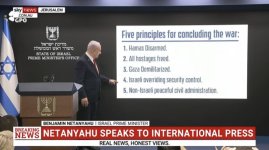What more do you need?
Do you have a link or a site name or source for where you found the table that you posted above, for the context that would go along with it?Link would’ve been nice to figure the context.
What more do you need?
Do you have a link or a site name or source for where you found the table that you posted above, for the context that would go along with it?Link would’ve been nice to figure the context.
Is your google broken? It took a fucking year for you to look at links that would lead you to the Kahanists (JKK) why on Earth would I trust you to follow a link posted after trying for a year?Do you have a link or a site name or source for where you found the table that you posted above, for the context that would go along with it?


I’m not going to chase my tail for you to (or not to) make some point. If what you’re saying is verifiable you’ll post a link or site a source, and if it isn’t or you don’t, I can govern myself accordingly.Is your google broken? It took a fucking year to look at links that would lead you to the Kahanists (JKK) why on Earth would I trust you to follow a link posted after trying for a year?

82% of what or whom? Etc…this is pretty out’a context making it irrelevant without details. Is this 82% of the global population of 200-300 “Shlomo Helbrans” (the Jewish Talibanians)? 82% of left-handed lesbians? 82% of Martians? Gots some details & a link?
Are Botswanians committing a genocide? Seriously man, if it’s a point you’re trying to make, cite it or don’t, your call, but if not when requested then I’ll treat it for what it is, is all, as I’m assuming anyone else would, regardless or the topic.Are we talking about Botswanas or...? Are Botswanans committing a genocide? Yes? No?
The Israeli Gov't that you and I pegged as "the Klan" when shown the light?Well, whatever…here is what the Israeli government is actually stating:
View attachment 30507
View attachment 30506
(YouTube & "Hamas [makes it clear] it will not relinquish its control over Gaza through peaceful means.")
I’m not going to chase my tail for you to (or not to) make some point. If what you’re saying is verifiable you’ll post a link or site a source, and if it isn’t or you don’t, I can govern myself accordingly.
Your table didn’t state who or what like so:
View attachment 30508
And with out context, source, etc…
Are Botswanians committing a genocide? Seriously man, if it’s a point you’re trying to make, cite it or don’t, your call, but if not when requested then I’ll treat it for what it is, is all, as I’m assuming anyone else would, regardless or the topic.
Uh-oh...
This is how civil wars start.
Are the Nazionists kaput?
Israel’s plan to occupy Gaza deepens rift between government and IDF
Lorenzo Tondo
in Jerusalem
Israelis are united behind the army, and a clash with the military could have irreparable consequences for the administration
Sun 10 Aug 2025 12.00 BST
Israel’s decision to approve a plan to occupy the Gaza Strip has reportedly deepened tensions between the government and the country’s military leadership, while also exposing fresh fractures within the army’s senior ranks and straining relations with reservists summoned for what could become the most dangerous phase of the war.
According to Israeli media reports, a bruising week of leaks and public recriminations has laid bare the rift between Israel’s political leaders and its military high command.
“This is the most severe crisis in the history of relations between the political echelon and the military since the 1948 war,” said Prof Yagil Levy, the head of the Institute for the Study of Civil-Military Relations at the Open University of Israel. “Never before has the political leadership compelled the military to execute an operation it adamantly opposed.”
In the seven days leading up to the pivotal meeting of Israel’s security cabinet at which the plan was approved, the chief of staff, Lt Gen Eyal Zamir, had repeatedly voiced his misgivings over the move to fully occupy the territory, warning that taking over Gaza would plunge Israel into a “black hole” of prolonged insurgency, humanitarian responsibility and heightened risk to hostages.
Zamir’s dissent ignited a political storm, with the son of the prime minister, Benjamin Netanyahu, accusing the army’s chief of staff of mutiny. Israel’s far-right national security minister, Itamar Ben-Gvir, urged the chief of staff to “clearly state he will fully comply with the political leadership’s instructions, even if the decision is to occupy Gaza”.
Some Israeli reports suggested Zamir could resign.
Over the course of the war, Israel’s military and intelligence leadership has already been shaken by a series of high-profile departures: Zamir’s predecessor as chief of staff, Herzi Halevi, and the former head of the Shin Bet security service, Ronen Bar, were both manoeuvred into resigning. Senior commanders including Aharon Haliva, Yaron Finkelman, Oded Basyuk and Eliezer Toledano have also stepped down, alongside top figures in military intelligence and the Shin Bet.
Since its founding in 1948, the Israel Defense Forces (IDF) has been more than a military organisation; it has been woven into the country’s national identity, hailed as a near-sacred institution, the ultimate guarantor of the state’s survival and a living symbol of the collective spirit that forged the nation.
The Israeli public has long been united in its support of the army.
A clash between the military leadership and the government, analysts warn, could have irreparable consequences for public support for the Israeli administration.
A dispute between the army leadership and the government “could intensify public protest, fuelled both by concern for the hostages and by the fact that, until now, the military had provided legitimacy for continuing the war,” said Levy.
According to Yedioth Ahronoth, one of Israel’s largest newspapers, the military’s divisions run not only between the government and the IDF’s senior command, but also within the army’s own upper echelons.
The discontent also appears to be spreading to the rank and file. An increasing number of Israeli soldiers are refusing to return to Gaza, shaken by the heavy toll of Palestinian civilian deaths during the military offensive.
Last June, in a letter addressed to Netanyahu, the defence minister, Israel Katz, and the head of the military, a group of 41 officers and reservists said the government was waging an “unnecessary, eternal war” in Gaza and announced they would no longer participate in combat operations in the territory.
According to Israel’s national broadcaster, Kan, only 60% of soldiers are showing up to reserve duty. The number includes the so-called “grey refusals” – those who cite medical conditions, invoke family obligations, or quietly leave the country during the call-up period and “forget” to check their emails.
The IDF has been approached for comment.

LinkThe [Genocide] Convention defines genocide as any of five "acts committed with intent to destroy, in whole or in part, a national, ethnic, racial or religious group." These five acts include killing members of the group, causing them serious bodily or mental harm, imposing living conditions intended to destroy the group, preventing births, and forcibly transferring children out of the group. Victims are targeted because of their real or perceived membership of a group, not randomly. The convention further criminalizes "complicity, attempt, or incitement of its commission." Member states are prohibited from engaging in genocide and are obligated to pursue the enforcement of this prohibition. All perpetrators are to be tried regardless of whether they are private individuals, public officials, or political leaders with sovereign immunity.
Israel doesn't recognize the the enforcement thru the ICJ. Palestine can't sign as a fledgling UN member.
Why allow your genocide to be live streamed? It's not good for business.View attachment 30511
And less someone like Tax claim it's BS or whatever...

Israeli Strike Kills Five Al Jazeera Journalists Near Gaza Hospital
Israel's military said it targeted and killed a Hamas cell leader posing as an Al Jazeera journalist in an airstrike on Gaza City on Sunday, a claim condemned by the Qatari broadcaster.ground.news
Go pick your poison bias from there.
I prefer stories that don't lean a certain way.
When you're killing over 200 Journalists, regardless of their Press protections or not, you are NOT the 'good guy' in the equation.
Kinda makes a body wonder how Palestine signed (technically "acceded") to the Convention on 2 April 2014).Israel doesn't recognize the the enforcement thru the ICJ. Palestine can't sign as a fledgling UN member.
Why? The PA is secular.Kinda makes a body wonder how Palestine signed (technically "acceded") to the Convention on 2 April 2014).


 instagram.com
instagram.com
GoodView attachment 30530

East-End Acts on Instagram: "🚨 WEEK OF ACTION: EAST END CALLS FOR AN ARMS EMBARGO 🚨 The new Arms Embargo Now report confirms what we’ve long known: Canada is still arming Israel, despite government claims to the contrary. Over 421,000 bullets and do
1,652 likes, 23 comments - eastendacts on August 6, 2025: "🚨 WEEK OF ACTION: EAST END CALLS FOR AN ARMS EMBARGO 🚨 The new Arms Embargo Now report confirms what we’ve long known: Canada is still arming Israel, despite government claims to the contrary. Over 421,000 bullets and dozens of weapons...instagram.com




Why didnt you follow the links leading to the Jew Klux Klan a year and a half ago?Weirdly, this YouTube video does not mention Hamas in its title whatsoever.